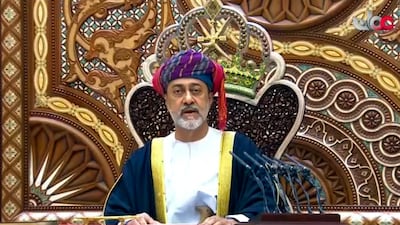Sultan Haitham bin Tariq Al Said, 65, has been sworn in after Oman’s Defence Council announced he would succeed the late Sultan Qaboos as ruler of Oman.
A tweet from an Omani Government account said that he had been sworn in "after a meeting of the family" and that the decision to appoint him reflected the wishes of Sultan Qaboos.
At his swearing-in ceremony this afternoon, Sultan Haitham said that "Sultan Qaboos had built a modern nation".
Sultan Haitham’s message to Omanis and the world was clear: Oman would continue down the path laid by Sultan Qaboos as a facilitator of peace.
He vowed to "continue the journey" his predecessor had started. He also said Oman would continue the foreign policy approach adopted by the late Sultan, one based on "peaceful coexistence between nations" and on non-interference.
“We will follow the same line as the late sultan, and the principles that he asserted for the foreign policy of our country, of peaceful coexistence among nations and people, and good neighbourly behaviour of non-interference in the affairs of others,” he said in his first public remarks as sultan.
The 66-year-old shook hands with family members and top security officials before witnessing ceremonial cannon fire.
Sultan Qaboos shaped Oman’s policy of diplomatic balancing. Under his leadership, Oman was a facilitator of talks between adversaries Iran and the United States. Oman is a close ally of Washington and viewed as a valuable regional player.
Sultan Haitham, an Oxford graduate, is a career diplomat who has spent 16 years in various foreign ministry roles since 1986. He has served in a range of official positions, including undersecretary of the ministry of foreign affairs and the secretary general for the ministry of foreign affairs, as well as minister of heritage and culture.
He was also the first head of Oman's football association in the 1980s. His role as minister of national heritage and culture helped project Omani influence. He has not overseen important defence and security portfolios.
During his time at the foreign ministry, Sultan Haitham helped Yusuf bin Alawi, Oman’s minister of state for foreign affairs, formulate the country’s policy of political non-alignment. It is expected that he will continue with the same foreign policy priorities.
He has often chaired cabinet meetings is an experienced member of the ruling family. He is well known and respected among Omanis.
The death of Sultan Qaboos was announced on Saturday morning. He was 79 years old and had ruled Oman for almost 50 years. He was credited with modernising the country and in developing its unique role as a regional mediator.
Sultan Haitham is seen by many Omanis as the “most experienced and versatile” of the senior royals, said Sharifa Al Siyabi, an Omani political commentator.
“We support the choice of Haitham as our next sultan. What is important now is the stability of the country and for the policies of Qaboos to continue,” Ms Al Siyabi told The National.
“He is most experienced and most versatile from the royal family and he is a natural choice as the new sultan,” she said
Diplomats say that Sultan Haitham’s past record as a “political moderator” during his time in the ministry of foreign affairs had “tipped the balance” in his being named successor to Sultan Qaboos.
“He has the right background and the mental stability to be the successor of the late sultan. He has worked with foreign powers during his time in the foreign affairs ministry and is well accepted by the United States, Britain, France and Oman’s neighbours such as the United Arab Emirates, Saudi Arabia, Qatar and even Iran,” a foreign diplomat based in Muscat, who did not want to be identified, told The National.
Kristian Coates Ulrichsen, a Gulf expert at Rice University’s Baker Institute for Public Policy, said Sultan Haitham’s background in culture and heritage is another sign of continuity with Sultan Qaboos, whose love of culture and music was well known.
The new sultan is known in international policy circles because of his interactions with world leaders and relations with other royal families, like Britain’s Prince Charles and his wife Camilla.
This experience provided him with “the necessary political gravitas and foreign policy expertise to help steer Oman into a post-Qaboos era,” said Sigurd Neubauer, a Middle East expert, in an analysis for The Arab Gulf States Institute in Washington.
Ms Al Siyabi said Sultan Haitham would also have an “extra backing” from his older brother, Asad bin Tariq Al Said, 69, who is expected to continue his role as the Personal Representative of the Sultan of Oman.
“Haitham will always find his brother as a pillar of support in his role as Personal Representative of the Sultan. Asad was a military strategist and well versed in security matters,” she said.
The sultan's older brother is a Sandhurst graduate who served as a major general in the Omani armed forces before assuming his present position.













